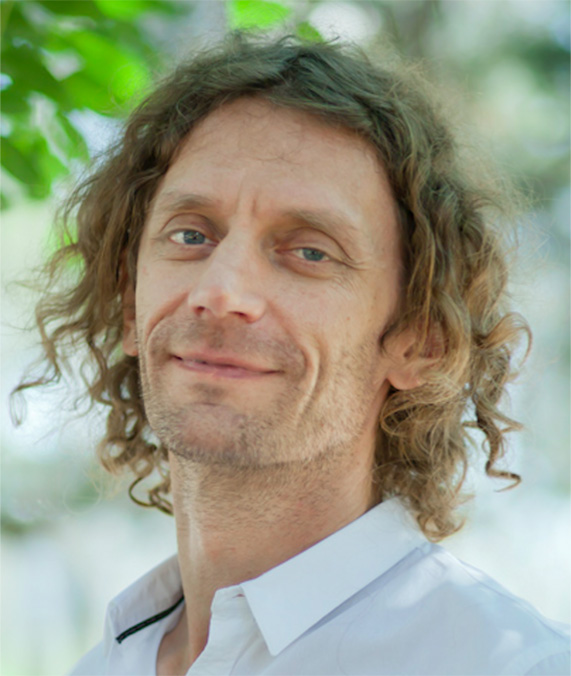
Since 2008, Emmanuel Barillot, heads the Department of Epidemiology, Biostatistics, Bioinformatics and Computational Systems Biology of Cancer (U900), a joint Institut Curie and INSERM research department, in partnership with Mines ParisTech. His own research focuses on Computational Systems Biology of Cancer, and aims at understanding tumorigenesis and tumor progression using computational approaches and developing methodological approaches when needed. This means on one hand developing original statistical methods and biological network modeling approaches; and on the other hand conducting statistical analysis of high-throughput biological data, integration of heterogeneous data, and network modeling in the context of cancer. Among key results obtained by computational biology approaches are the elucidation of determinants of migration, invasion and metastasis in colon carcinoma using network modeling, the exploration of basal and luminal subtypes in bladder carcinoma using independent component analysis, or the deciphering of the signalling mechanisms explaining medulloblastoma heterogeneity. E. Barillot also heads the institut Curie Bioinformatics Core Facility, which is expert in biological data integration, NGS data analysis, and support for precision medicine (in particular in the context of the France Médecine Génomique program). Barillot has published around 180 papers in the fields of bioinformatics, genomics, systems biology, cancer biology, translational and clinical research, biophysics, and computer science.
Talk title: Some new challenges in computational molecular oncology
Abstract: Many initiatives are launched to enable precision medicine in oncology based on the molecular profiles of tumors. Also new technologies like single cell analysis open new avenue of research in oncology. Both the clinical and cognitive approach come with important challenges in statistical analysis method development. I will present in particular examples on 1) a pediatric cancer, medulloblastoma, and 2) the problem of trajectory reconstruction in single cell sequencing.

Silvio Bicciato is a full professor in Industrial Bioengineering at the University of Modena and Reggio Emilia. He studied Chemical Engineering at the University of Padova where he obtained his PhD degree in the same field. In 1996, he was awarded a NATO-CNR post-doctoral fellowship to join the Metabolic Engineering Laboratory (Prof. G. N. Stephanopoulos) at the MIT Department of Chemical Engineering (Cambridge, USA). Since 1997, his principal research interest has been the design and application of bioinformatics methods to analyze genomic data obtained using high-throughput technologies. In 2008, he established the Bioinformatics core unit of the Center for Genome Research at the University of Modena and Reggio Emilia. Over the last decade, his bioinformatics group contributed methods, algorithms, and tools for the multi-dimensional integrative analysis of genomics, transcriptomics, epigenomics, proteomics, and phenotypic data. Combining multi-omics data and computational expertise, his group supported the discovery of new layers of molecular connectivity between the genome and its functional output in the research areas of onco-genomics, immunogenomics, and neurosciences. Nowadays, his current research interest is the development of computational methods to resolve the spatial, architectural and social heterogeneity of cells within a tissue, to capture the evolution of cellular ecosystems in time, and to detect the dynamics of epigenetic regulation.
Talk title: Integrative bioinformatics for precision medicine
Abstract: Data from multiple -omics entangle the cross-sectional hierarchy of biological phenomena. Their integration opens new prospects for investigating cell identity, fate decision, and function within tissues and is expected to translationally impact human health and well-being. In this talk, I will introduce computational strategies and new bioinformatics challenges to transform collections of molecular signals into mechanistic and predictive models.

Raffaele Giancarlo is currently professor of Computer Science in the Department of Mathematics and Computer Science at the University of Palermo. He received a PhD in Computer Science from Columbia University in 1990. He has been affiliated (permanent, visiting) with several National and International Institutions, e.g., Univ. of Salerno, Bell Labs, Max Plank Institute, CNRS. He is currently Associate Editor in 5 journals, e.g., BMC Bioinformatics, Theoretical Computer Science. He holds 6 patents awarded by the US Patent Office, in Information Retrieval, Natural Language Processing and Data Warehousing, and he is co-author of over 100 papers covering aspects of Pattern and Class Discovery, Classification, Information Retrieval, Data Analysis for the Life Sciences, Fundamental Algorithms, Information and Coding Theory. He has been and is actively involved in the Governance of Professional Societies, Research Consortia, nationally, and at University of Palermo, locally. His research has been funded via industrial and academic grants. Grant Reviewer, among others, for US NSF and the Royal Society, UK. Tenure Promotion Committee member for Universities in Canada, Israel and the US.
Talk title: DNA combinatorial messages and Epigenomics: The case of chromatin organization and nucleosome occupancy in eukaryotic genomes
Abstract: Epigenomics is the study of modifications on the genetic material of a cell that do not depend on changes in the DNA sequence, since those latter involve specific proteins around which DNA wraps. The end result is that epigenomic changes have a fundamental role in the proper working of each cell in Eukaryotic organisms. A particularly important part of Epigenomics concentrates on the study of chromatin, that is, a fiber composed of a DNA-protein complex and very characterizing of Eukaryotes. Understanding how chromatin is assembled and how it changes is fundamental for Biology. In more than thirty years of research in this area, Mathematics and Theoretical Computer Science have gained a prominent role, in terms of modeling and mining, regarding in particular the so-called 10nm fiber. Starting from some very basic notions of Biology, we briefly illustrate the recent advances obtained via laboratory experiments on the organization and dynamics of chromatin. Then, we mainly concentrate our attention on the contributions given by Combinatorial and Informational Methodologies, that are at the hearth of Mathematics and Theoretical Computer Science, to the understanding of mechanisms determining the 10nm fiber. We conclude highlighting several directions of investigation that are perceived as important and where Mathematics and Theoretical Computer Science can provide high impact results.

Roded Sharan is a full Professor in the School of Computer Science, Tel Aviv University. His PhD studies in the School of Computer Science at Tel Aviv University under the guidance of Prof. Ron Shamir and his post-doctoral training in the University of California at Berkeley under the guidance of Prof. Richard Karp shaped his interests in bioinformatics and systems biology. At the end of his post-doctoral training he was offered a Senior Lecturer position at Tel Aviv University to which he returned as an Alon fellow. Additional awards he obtained include the Krill prize of the Wolf Foundation, Best Paper award in the RECOMB'10 conference, Test of time awards in RECOMB'16 and RECOMB'17, the Thomson-Reuters highly cited researcher award and the Kadar prize for excellence in research. Currently he heads a research group that specializes in the analysis of biological networks and their applications to medicine.
Talk title: Harnessing protein networks to elucidate disease mechanisms
Abstract: Protein networks are increasingly used to enrich our knowledge about disease by integrating diverse molecular measurements into one computational framework. In this talk I will describe several recent works in my lab that employ network analysis and modeling strategies to associate novel genes and modules with disease and identify potential therapeutic targets.

